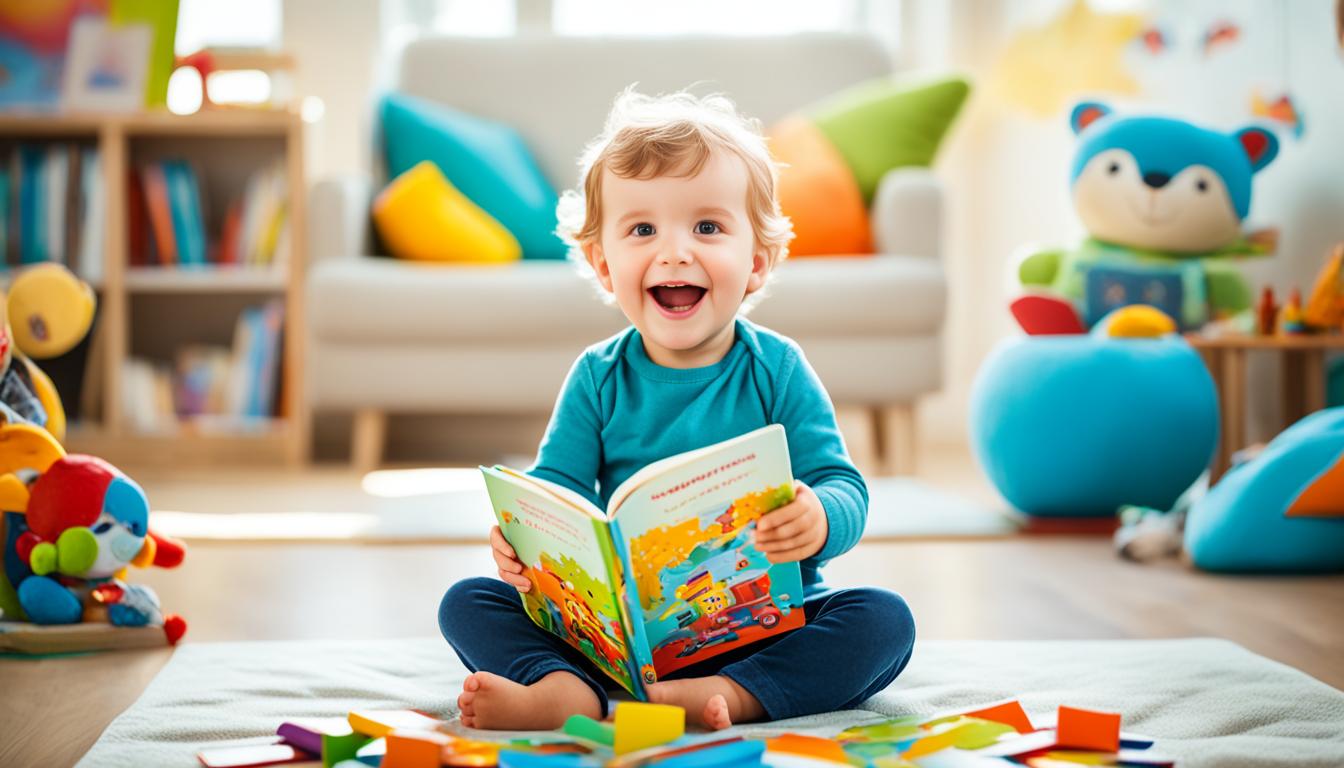To comprehend the milestones of baby talking, it is important to recognize the key stages in speech development. Around 4-6 months, babies start babbling with consonant and lip sounds, associating these sounds with actions such as crying. By the time they reach 10 months, they are able to produce sounds and may even create their own words. Typically, babbling begins at 6 months, with single words starting to appear around the age of 12 months. Two-word phrases begin to emerge between 18-24 months, and their vocabulary expands rapidly by the age of 3. You can support your baby’s development through interactive play, reading, and creating a language-rich environment. It is important to be attentive to any signs of delayed speech for early intervention. By supporting your baby’s speech development now, you are laying a solid foundation for their future communication skills.
Key Takeaways
- Babbling with consonant and lip sounds emerges around 4-6 months.
- Association of sounds with sources like crying and gurgles occurs around 4-6 months.
- Combining sounds and using invented words by 10 months.
- Single words typically emerge around 12 months.
- Vocabulary expands rapidly between 2-3 years.
Key Baby Talking Milestones
Around 4 to 6 months of age, your baby begins to reach key talking milestones by starting to babble with various consonant and lip sounds. This stage marks the beginning of your child's speech and language development journey.
Initially, babies start associating sounds with sources, including crying, gurgles, and vowel sounds as their first forms of communication. As your little one progresses, around 4 to 6 months, they start babbling with sounds like back-of-the-tongue consonants (g, k) and lip sounds (m, w, p, b).
By 10 months, your baby may combine sounds and use invented words, paving the way for uttering their first word around 12 months.
Understanding these early language milestones is important in monitoring your child's progress and identifying any potential speech or communication disorders. Encouraging and engaging with your baby during these stages can have a significant impact on their language development and ability to communicate effectively.
Stay attentive to these milestones as your child begins the exciting journey of speech and language acquisition.
Early Speech Development Stages

During the early stages of speech development, babies start with babbling and cooing sounds, laying the groundwork for their first words.
Around 4 to 6 months, you may notice your baby experimenting with different consonant sounds like 'g' and 'k'.
Babbling and Cooing
In the early stages of speech development, babies typically begin babbling and cooing to explore their vocal abilities. This is an essential phase where infants experiment with sounds and gestures to communicate.
Here are some key points to understand about babbling and cooing:
- Around 4 to 6 months, babies start babbling with simple sounds like 'ma' and 'na' as they explore their vocal abilities.
- Babbling becomes more complex as babies approach 12 months, with sounds like 'gaga' emerging.
- By 10 months, babies may use invented words and gestures to express their needs and interests.
During this stage, infants are laying the groundwork for future language development. As they progress from babbling to incorporating recognizable words around 12 months, they start to grasp and replicate language patterns. Keep encouraging these early communication attempts to support your baby's speech milestones.
First Words Spoken
As your baby progresses from babbling and cooing to exploring their vocal abilities, one of the early speech development stages involves uttering their first words around 12 months of age. This milestone marks a significant step in your child's language development. Commonly, words like 'mama' and 'dada' are among the first spoken by babies, showcasing their growing speech and language skills. Around 10 months, babies begin using invented words and combining sounds to communicate, preparing them for this exciting phase.
To understand more about the first words spoken by your child, let's explore a table highlighting key points:
| Developmental Stage | Description |
|---|---|
| Invented Words | Babies start using made-up words around 10 months, showing creativity in their language development. |
| Gestures and Grunting | Understanding gestures and sounds like grunting are vital steps towards effective communication. |
| Recognition of Own Name | By 4.5 months, babies recognize their own name, a significant word in their emerging vocabulary. |
Speech Progression in Babies
Babies typically begin their speech progression by exploring different sounds like crying, gurgling, and vowel sounds in the early months. As your child grows, they'll start babbling and experimenting with various sounds.
Here are some key points to understand about your child's speech progression:
- Around 4 to 6 months, your baby will start babbling with sounds like ma, na, oo, aa, and ee.
- Between 7 to 12 months, babbling will evolve into more word-like sounds, such as intentional repetitions like gaga.
- By 12 months, your baby may say their first word and begin combining sounds to form simple words.
If you notice any speech delays or concerns about your child's ability to understand or form words together, consulting a speech-language pathologist can provide valuable insights.
Encouraging Language Skills

To encourage language skills in your baby, engage in interactive play and read together to boost their vocabulary.
Respond enthusiastically to their communication attempts to build their confidence in speaking.
Interactive Play for Language
Engage with your baby in interactive play to foster and enhance their language development. Interactive play is an essential component in helping your baby develop their communication skills, social skills, and vocabulary expansion.
Here are three key benefits of incorporating interactive play into your daily routine:
- Enhances Language Development: Through activities like talking, singing, and playing with toys, babies can learn new words and concepts, strengthening their language skills.
- Encourages Communication and Social Skills: Interactive play provides opportunities for babies to engage with others, helping them practice their listening, speaking, and understanding of language.
- Expands Vocabulary: By exposing babies to a variety of words and phrases during playtime, you can help broaden their vocabulary and language comprehension.
Reading Together Boosts Vocabulary
Reading together with your baby greatly enhances their vocabulary development and language skills. Studies have shown that children who are read to regularly tend to have larger vocabularies.
When you read aloud to your baby, you introduce them to new words and concepts, helping them grasp language more effectively. Engaging in storytime activities not only fosters a love for reading but also improves their communication skills and cognitive development.
By making reading a daily routine, you can actively support your baby's language development and literacy skills. Through this shared activity, you create a nurturing environment that encourages language growth and enhances their overall understanding of the world around them.
Signs of Delayed Speech Development

If you notice limited babbling or a lack of response to sounds or voices by 12 months, these could be signs of delayed speech development.
By 18 months, limited vocabulary or difficulty following simple instructions may also indicate a speech delay.
As your child grows, reaching 2-3 years, unclear speech or trouble forming simple sentences could persist, pointing towards potential speech delays.
Causes of speech delay vary from hearing loss to psychosocial deprivation or being a twin.
Early diagnosis and intervention are essential for addressing speech concerns effectively.
Seek evaluation by a healthcare professional if you observe these signs.
Addressing Speech Concerns

To address speech concerns in babies effectively, monitoring their social interaction, tongue function, and response to stimuli is essential.
Factors such as psychosocial deprivation, being a twin, or elective mutism can contribute to speech delays in children.
If you're worried about your child's speech development, it's advisable to seek evaluation from a speech-language pathologist.
Early diagnosis of speech delays is important as it can lead to effective interventions and corrections.
Monitoring your child's hearing and speech progress, along with seeking professional help, can aid in addressing speech concerns effectively.
By staying proactive and observant, you can make sure that any speech issues are identified early and the necessary support is provided.
Supporting Baby's Speech Development

Support your baby's speech development by engaging in interactive conversations and responding to their babbling cues enthusiastically.
Here are some tips to support your child's language skills:
- Engage in daily conversations: Talk to your child throughout the day, describing activities and objects around them to help expand their vocabulary.
- Read to your child: Reading books aloud can introduce new words and concepts, enhancing your child's language development.
- Encourage spatial concepts: Use words like 'under,' 'behind,' and 'next to' to help your child understand spatial relationships.
Regularly monitoring your child's speech development is essential. If you have concerns about your child's language progress, consult your child's doctor or a healthcare professional specializing in speech development.
Frequently Asked Questions
What Are the Stages of a Baby Talking?
You start with cooing and gurgling sounds, then progress to babbling and first words. By 12 months, simple words like 'mama' or 'dada' emerge. Between 18-24 months, you use simple phrases and have a vocabulary of 50+ words.
What Is the Average Time for a Baby to Start Talking?
On average, you can expect your baby to start talking around 12 months, but remember, every child is unique. By 24 months, most little ones can say about 50 words and make themselves understood.
When Should I Be Concerned About My Baby Talking?
If your baby isn't babbling by 6 months, lacks gestures and eye contact by 12 months, or doesn't say words by 18 months, it could signal potential speech delays. If two-word phrases are absent by 2-3 years, consult a professional.
How Many Words Should a 1 Year Old Say?
A 1-year-old typically says around 1-3 words like 'mama,' 'dada,' or 'hi.' By 18 months, your child should have a vocabulary of 5-20 words. If not, consulting with a professional may be advisable.
Conclusion
Now that you have a better understanding of baby talking milestones, you can support your little one's speech development with confidence.
Remember, every baby is unique and will progress at their own pace. By encouraging language skills and addressing any concerns early on, you can help your child reach important speech milestones.
Keep talking, reading, and engaging with your baby to foster their communication skills and watch them flourish.









